Do Thyroid Supplements Help Thyroid Patients Feel Better?
If you were to ask an endocrinologist or another conventionally trained doctor if thyroid supplements they would tell you “no”.
They would also tell you that the only way to improve thyroid function is by taking thyroid medication such as levothyroxine or Synthroid.
But is this actually true?
Not really and to prove it we are going to look at basic thyroid physiology and how supplements can help support your thyroid.
This isn’t rocket science.
This is just plain old human physiology.
If that term is new to you, let me explain:
Physiology simply refers to how the body works and functions.
Physiology is important because in order to understand how to fix a problem we must understand why that problem exists.
When it comes to the thyroid we know that it requires certain nutrients and ingredients to function optimally.
If you are deficient in any of these nutrients then thyroid function will be slightly impaired.
It’s really that simple.
It can get confusing when we talk about the different levels at which thyroid function can be impaired but, don’t worry, because even that part isn’t that difficult.
We can use this understanding to reverse engineer how and why thyroid supplements are effective.
Today you will learn:
- Why nutrient deficiencies plague thyroid patients and how these nutrient deficiencies impact thyroid physiology.
- The most effective vitamins and nutrients that thyroid patients can take.
- Why thyroid function brings down other organ systems and how these organs systems impact thyroid function in a vicious cycle.
- Why thousands and thousands of thyroid patients opt to use thyroid supplements each and every day.
Let’s jump in…
DOWNLOAD FREE RESOURCES
Foods to Avoid if you Have Thyroid Problems:
I’ve found that these 10 foods cause the most problems for thyroid patients. Learn which foods you should avoid if you have thyroid disease of any type.
The Complete List of Thyroid Lab tests:
The list includes optimal ranges, normal ranges, and the complete list of tests you need to diagnose and manage thyroid disease correctly!
How Thyroid Supplements Work:
If you are a thyroid patient then you have to understand that there is a bias against supplements that exist among all doctors.
It’s a strange bias and I remember encountering it during my training as a resident.
Pretty much any time supplements were brought up by patients they were hand waved away by attending physicians as something that wasn’t worth looking at.
I took on that attitude myself until I started taking them and saw a huge improvement myself.
Do supplements always work? No, they don’t.
Will taking supplements help completely fix or reverse your problem? Probably, not.
And that is one of the biggest downsides to using supplements and probably why most doctors don’t recommend using them.
But a huge part of why there may be inconsistencies in how supplements help thyroid patients has to do with which supplements they are using.
If you target your supplements to KNOWN issues and to specific areas of thyroid physiology then that will give you the best shot at seeing some improvement.
Over the last 5 years, I’ve had the opportunity to help thyroid patients with supplements that I’ve created.
Based on this experience, I see around an 80% effective rate when the right supplements are used.
Is it perfect? No, but that means that roughly 8 out of 10 people who use thyroid supplements will see SOME improvement.
This might as well be a dream scenario for thyroid patients, though, who are taking levothyroxine and Synthroid and who may be feeling WORSE.
With this in mind, let’s talk about how thyroid supplements work and have the potential to help you feel better:
#1. Supplements provide building blocks for thyroid hormone production.
One of the first things that thyroid supplements can do is provide building blocks as a substrate for the production of thyroid hormone.
If that was confusing, let me explain it this way:
Thyroid hormone, the thing that you need if you have low thyroid function, requires certain nutrients to produce.
If you are deficient in any of these nutrients then your body lacks what it needs to produce the final product.
Imagine you are trying to manufacture cars in a big manufacturing plant.
In order to make the car, you need wheels, a body or frame, a steering wheel, computer chips, and much more.
Using this analogy, replace the car with thyroid hormone and replace wheels with iodine, replace the body with tyrosine, and replace the steering wheel with iron.
If you are missing any of these components the final product that you produce will be insufficient regardless of whether we are talking about cars or thyroid hormone.
And this happens in so many thyroid patients primarily because these nutrient deficiencies are rampant!
I’m not talking about huge nutrient deficiencies, either.
Even a small decrease in these nutrients say 5-10%, is enough to slow down thyroid function and limit how much thyroid hormone your body can produce on its own.
Let’s talk about some of these building blocks.
The most well-known is iodine.
Iodine is what makes thyroid hormone, thyroid hormone.
In fact, it is the number of iodine compounds attached to tyrosine (1) that determines what type of thyroid hormone your body is creating.
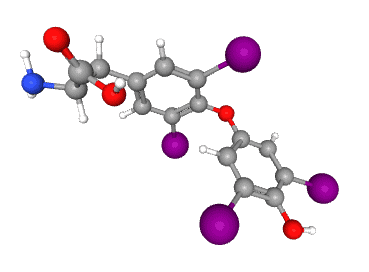
If you don’t have enough iodine then you won’t be able to produce thyroid hormone.
But that’s not all, other nutrients are also required.
Another important nutrient is tyrosine.
Tyrosine forms the backbone of thyroid hormone (2) that iodine attaches to.
Let’s say you have enough iodine in your body but you don’t have enough tyrosine.
In this setting, you still won’t be able to produce enough thyroid hormone because the iodine has nowhere to go or nowhere to attach to.
Lastly, you also need iron to produce thyroid hormone.
If you don’t have enough iron then the enzyme which actually puts thyroid hormone together, known as thyroid peroxidase (3), won’t function correctly.
So in the case of iron deficiency, your body can produce fractions of T4 and T3 but your body won’t be able to put them together to create the finished product!
If this is confusing you, don’t let it.
Allow me to simplify:
Iodine, iron, and tyrosine are all necessary for your thyroid to produce thyroid hormone.
If you are deficient in any one of these nutrients then your body may not be able to produce enough thyroid hormone.
If you can’t produce enough thyroid hormone then you may experience low thyroid symptoms such as weight gain, fatigue, depression, hair loss, and more.
What’s the answer?
To ensure that you have enough of these important nutrients!
And you can do that by TAKING them in supplement form.
If you are low in any of these nutrients, taking supplements can help normalize those levels which will then help your body produce more thyroid hormone.
Simple, right?
Why doctors fail to understand this is beyond me but here we are.
The next thing you should be asking yourself is whether or not you have enough of these nutrients in your body because if you don’t, then it may be time to start putting them back into your body!
Some of these nutrients, such as iron, can be easily tested for in the blood.

Other nutrients such as iodine and tyrosine are more difficult to test for, so a process of trial and error may be in order.
When it comes to iron, you can check your iron status by looking at basic iron and ferritin levels.
Women are most at risk for iron deficiency due to their menstrual cycle.
When it comes to iodine, MOST thyroid patients (in fact, many people in the United States) are at risk for deficiency due to soil depletion (4), a decreased consumption of iodized salt (5), and an irrational fear of iodine.
A deficiency in tyrosine is less common but still does occur, especially in those who do not eat a protein-rich diet.
I put both iodine and l-tyrosine in my thyroid-specific multivitamin for this very reason.
Iron wasn’t added to this multivitamin because you shouldn’t take it unless you need it but it is safe to use both iodine and tyrosine.
If you are looking to get add l-tyrosine and iodine to your daily supplement regimen then look for levels within the range found here.
#2. Supplements can help your body convert thyroid hormone and activate it.
Another way that supplements can help support your thyroid is by improving something called thyroid conversion.
Thyroid conversion is the process that thyroid hormone undergoes in order to activate it.
From a physiological perspective, thyroid hormone really doesn’t do much unless it is in the T3 form.
But most thyroid hormone is produced in the T4 form.
So your body must activate T4 by turning it into T3.
To highlight how important this process is when you look at the difference between T4 and T3 thyroid hormones and how active they are, T3 beats T4 by about 200 to 300 times (6).
When it comes to the importance of thyroid hormone, T3 should always be your top priority because it does pretty much all of the heavy liftings.
The enzyme that your body uses to convert T4 to T3 is known as the deiodinase enzyme.
There are different types of deiodinase enzymes but you don’t really need to know about those.
Instead, what you need to know is that this enzyme requires selenium to function (7).
And selenium is another important nutrient that many thyroid patients are deficient in.
Let’s play this out:
Imagine that you have enough iodine, iron, and tyrosine to produce thyroid hormone because you’ve been taking supplements.
Because you are sufficient in these nutrients, you have no problem making thyroid hormone and getting it out into your body.
Now let’s imagine that you are selenium deficient.
In this setting, you are still able to PRODUCE or BUILD thyroid hormone but your body is unable to activate it!
So you may have enough T4 floating around in your body but you are missing out on the 200 to 300x activity that T3 thyroid hormone contains because your body can’t convert T4 to T3.
And guess what?
Using a selenium supplement can help improve this conversion process and help your body produce more T3.
Of course, this only really matters if you have a selenium deficiency because taking selenium when you already have enough will probably have a minor effect but most thyroid patients do NOT have enough selenium which is why so many people see improvement when they start taking it.
Selenium deficiency is quite common because the selenium content in foods varies based on soil content.
And because most soil is depleted of nutrients, selenium deficiency abounds!
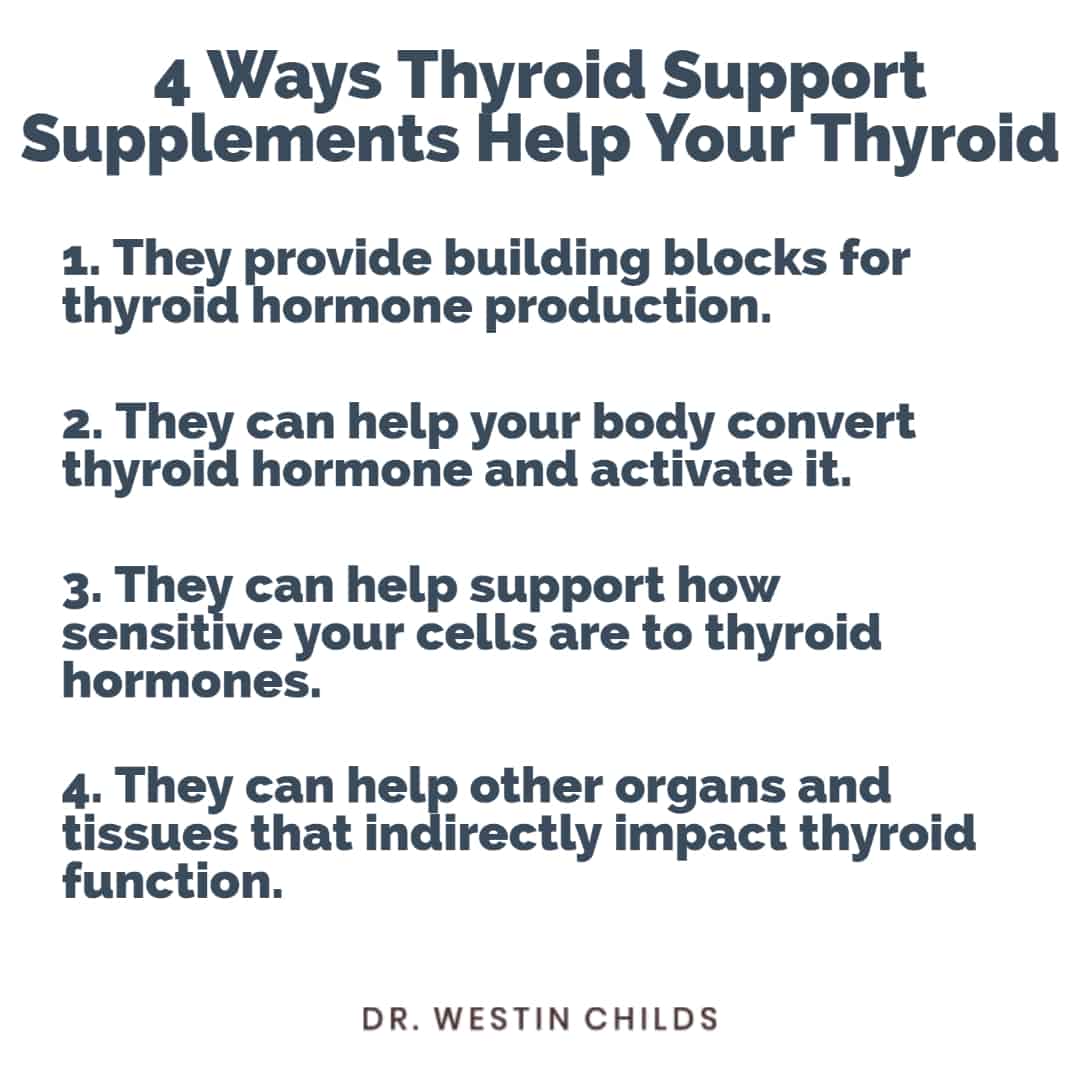
Selenium isn’t the only nutrient that your body needs to convert T4 to T3.
Another important nutrient is zinc.
Zinc is found at the thyroid hormone receptor site (8) on this enzyme as well.
And we know from studies (9) that even minor zinc deficiency leads to decreased T3 levels and even changes in the TSH.
Zinc, just like selenium, is another nutrient that thyroid patients are commonly deficient in.
It’s difficult to test for deficiencies in both of these nutrients because blood tests are often inaccurate.
Because of this, it’s often best to supplement with both and watch your body for improvement.
Beyond zinc and selenium, other nutrients such as guggul also show promise for enhancing T4 to T3 conversion.
If you want to take a supplement to help boost T4 to T3 conversion, then look at one such as this which contains these ingredients and more.
#3. Supplements can help support how sensitive your cells are to thyroid hormones.
Even after your body has produced and activated thyroid hormone it still has one more step it must undergo in order for that thyroid hormone to work.
It must interact at the cellular level.
Thyroid hormone, because it is a hormone, acts on cells differently than other compounds or proteins.
Thyroid hormone enters into the nucleus of the cell and changes genetic transcription (10).
This change in genetic transcription results in changes inside of the cell including the production of proteins and enzymes which then impact how that cell functions.
If you want thyroid hormone to work efficiently, then this process must work unabated.
Pretty much every cell in the body has a thyroid hormone receptor so you might be tempted to think that this process goes smoothly all of the time.
That’s where you would be wrong.
Just like many other hormones in the body, your cells can develop resistance to thyroid hormones.
This process is really no different from insulin resistance which is what causes type II diabetes.
The only difference is that in insulin resistance the resistance is to insulin and in thyroid hormone resistance the resistance is to thyroid hormone.
Thyroid hormone cellular resistance just means that your cells are not as sensitive to the thyroid hormone that they interact with as you would like them to be.
And this promotes a problem because you need it to happen if you want to feel better.
Two vitamins, in particular, seem to play an important role in helping to regulate sensitivity to thyroid hormones.
Those two fat-soluble vitamins are vitamin A and vitamin E.
It’s unclear exactly how they impact thyroid hormone cellular sensitivity but we know that a deficiency can suppress genetic transcription (11) and alter how well your brain can pick up changes to thyroid hormone in the bloodstream.
If your body is unable to sense changes to thyroid hormone concentration in the bloodstream then it won’t be able to respond by increasing or decreasing thyroid hormone as necessary.
The result is a drop in thyroid hormone and a resistance to changes to thyroid hormone levels in the cell.
We also know that taking both Vitamin A and Vitamin E, when deficient, does improve thyroid hormone levels!
We know this because up to 30% of the entire world is Vitamin A deficient and we can see the impact that both deficiency and supplementation have on thyroid function (12).
But how common are vitamin A and vitamin E deficiencies among thyroid patients in the United States?
Fairly common.
Vitamin A comes from both plants and animals.
In plants, it primarily comes from yellow, orange, and green vegetables.
Another thing to keep in mind is that zinc deficiency impacts vitamin A absorption which may make Vitamin A deficiency.
This matters to thyroid patients because they are often zinc deficient (as mentioned above) which will, therefore, impact their vitamin A status.
I find that sub-optimal deficiencies in vitamin A and vitamin E are common among thyroid patients which is why I have included both of these nutrients in my daily thyroid multivitamin.
If you don’t want to use my supplement then look for another supplement that contains similar concentrations of both.
#4. Supplements can help other organs and tissues that indirectly impact thyroid function.
You have to understand that thyroid hormone doesn’t work in a vacuum.
When we talk about biology and physiology there is the tendency to ignore all other systems in the body and focus on one specific pathway.
But underneath that one specific pathway, we know that there are hundreds if not thousands of other processes happening simultaneously at any given time.
And these other pathways are constantly interacting and impacting one another.
This also occurs with your thyroid!
Other organs and tissues can directly or indirectly impact how well your thyroid works because they are involved in thyroid regulation at various steps.
If you have a problem in any of these OTHER organs or tissues, it may impact thyroid function which will then impact how well you are feeling.
You can also think about it like this:
If you have problems with other organ systems in your body, say your liver or gut, these problems will have a tendency to drag your thyroid down as well.
This allows you a very unique opportunity as a thyroid patient.
You can take advantage of this knowledge and target these OTHER areas with additional non-thyroid-related supplements.
By combining supplements for other problems, you may be able to indirectly see improvement in thyroid function.
Let’s talk about these organs and systems which can drag down your thyroid:
- First up is gut function – Your gut is the site of at least 20% of thyroid conversion (13). In addition, it is also the site where your thyroid medication is absorbed. Problems in your gut may lead to decreased absorption of your thyroid medication and a reduction in T3 levels through thyroid conversion. Problems such as fungal overgrowth, bacterial overgrowth, acid reflux, constipation, irritable bowel syndromes, etc. can all impact thyroid function in an indirect way! You can take supplements such as proteolytic enzymes, probiotics, prebiotics, and L-glutamine to help improve gut function.
- Next up is liver function – Your liver is the major site of T4 to T3 conversion in the body! In fact, most of the T3 in circulation comes from your liver. Common problems such as insulin resistance can damage your liver and lead to impaired liver function. Impaired liver function may then impact thyroid conversion and, therefore, thyroid function (14). You can take liver support supplements and blood sugar support supplements (if you have fatty liver disease) to improve liver health and, therefore, thyroid function.
- Don’t forget your adrenals or cortisol levels – There is a strong connection between cortisol and TSH. If the thyroid goes down it will take cortisol with it. If cortisol goes down then it will take the thyroid with it. Because many people are under constant stress, it’s not uncommon to see both thyroid and adrenal problems at the same time. Even though these problems occur simultaneously, they must be treated differently. Using adrenal glandulars and adrenal adaptogens may help improve and balance cortisol levels which can then impact your thyroid.
- Lastly, you have to consider systemic inflammation – Inflammation, from any source, can limit how well thyroid hormone works. Inflammation is damaging to pretty much every system in the body but it is particularly harmful to thyroid function. Inflammation slows down T4 to T3 conversion which may result in low T3 levels. You may be able to cool down inflammation with supplements such as fish oil, bromelain (15), alpha lipoic acid, MSM (16), quercetin (17), and turmeric (18). Reducing inflammation may help indirectly improve your thyroid.
This information applies to ALL thyroid patients, even those without a thyroid.
It doesn’t matter if your thyroid is gone, you still need thyroid hormone to live.
And as long as you live you MUST be getting thyroid hormone from some source.
If your thyroid has been removed then that source will be from thyroid medication.
And that medication must still be activated and converted in order for your body to use it.
Even if your thyroid has been removed you most likely still have your gut, you still have your adrenals, and you still need to worry about inflammation!
So this information applies to pretty much every thyroid patient and every thyroid condition.
Final Thoughts
By putting this together, it’s easy to see how minor deficiencies can lead to big problems downstream.
Imagine if you have a minor deficiency in iodine which reduces how much thyroid hormone you can produce by 5%.
In addition, you also suffer from a 5% reduction in thyroid conversion from zinc and selenium deficiency.
In addition to that, you also have minor deficiencies in vitamin A and vitamin E which limit how effective your thyroid hormone is at the cellular level.
In addition to that, you also have a problem with your gut that limits how well your thyroid medication is being absorbed and/or converted.
These minor issues cascade downward, adding on top of one another until they reach some meaningful level.
This meaningful level is felt by you, the thyroid patient, as low thyroid symptoms even though you are faithfully taking your thyroid medication each and every day.
We don’t even have to get crazy in with our numbers here.
Assuming a 5% decline in nutrient deficiencies is pretty conservative as far as assumptions go.
In fact, it’s highly likely that something very similar to this is happening in your body right now which explains why so many thyroid patients benefit from thyroid supplements.
So the next time your doctor suggests that taking supplements for your thyroid is meaningless, think of this article!
Now I want to hear from you:
Are you currently taking any supplements to support your thyroid?
If so, have you felt any difference?
Did you already know how various nutrient deficiencies impact thyroid function? Did anything surprise you?
Are you planning on taking any supplements after reading this article?
Has your doctor told you that supplements are useless?
Leave your questions or comments below!
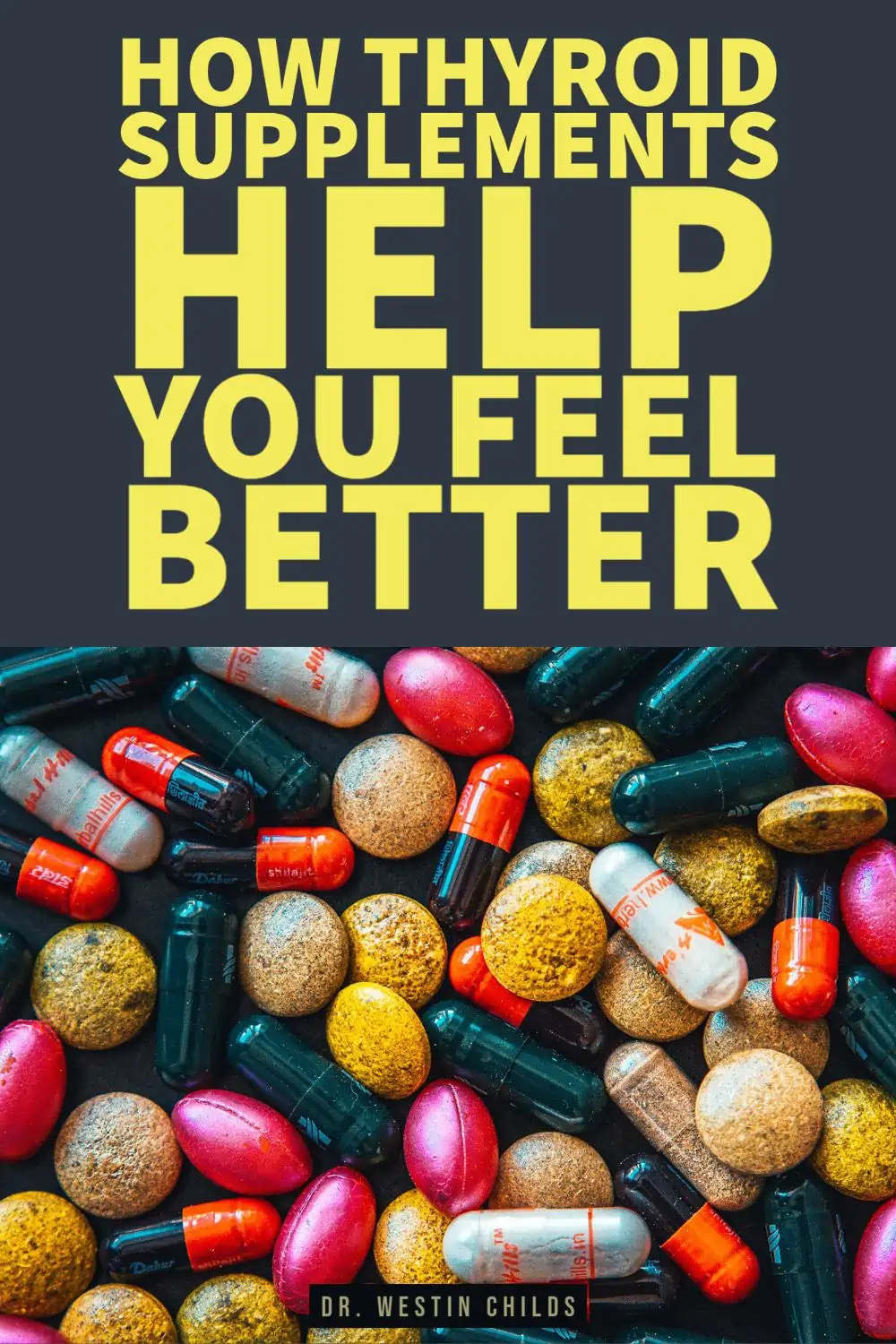
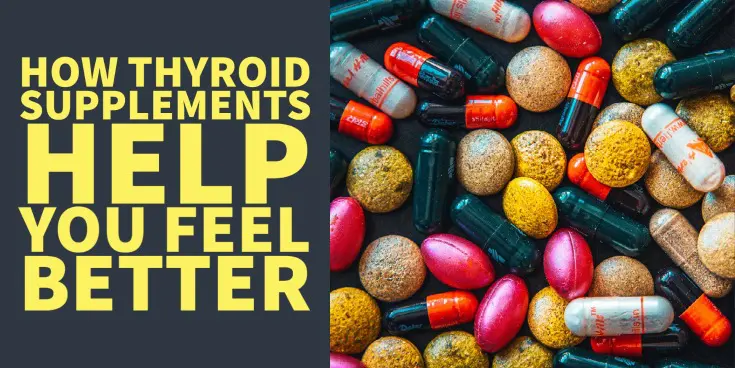





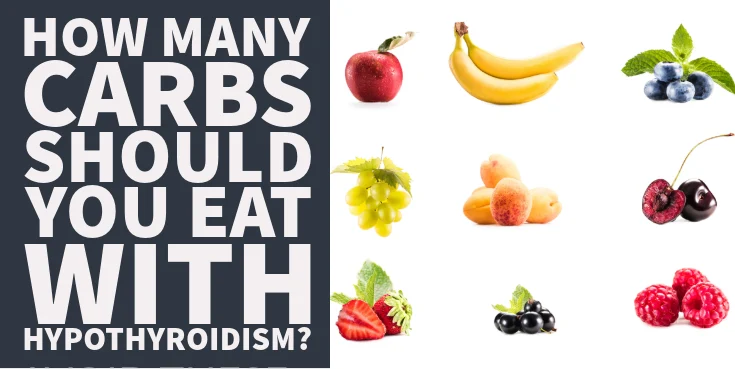


Hello Dr. Childs,
I have seen many other online resources mention the use of the L-Carnitine Amino Acid to help reduce symptoms of hyperthyroidism.
However, I do not see this mentioned as a natural alternative on your website.
What are your thoughts on the use of L-Carnitine?
Thanks.
Hi Abby,
L-carnitine has the potential to help reduce thyroid hormone action in peripheral tissues and can definitely be used in hyperthyroidism.
Hi Dr. Childs,
Can Synthroid cause Hypoglycemia?
Thanks.
Lisa
Hi Lisa,
It may contribute but only if it is used in excessively high doses.
Hi Dr. Childs,
I have no Thyroid or Parathyroids. Anything special I should be doing?
Thanks,
Cynthia
Hi Cynthia,
Yes, please see this article: https://www.restartmed.com/thyroidectomy-supplements/
Hello Dr. Childs,
When I first had my thyroid gland removed I was prescribed synthroid. It did not work for me I stay tired all the time couldn’t function daily. I found a doctor that prescribed armour thyroid. This works best for me. I feel 100 percent better
Hi Donita,
Glad you found what worked for you! Thanks for sharing 🙂
Hi Dr Childs;
I recently listened to your podcast with Amy Hornaman and was excited to hear that you suggested an alternative to the time of day to take thyroid meds – right before bed. This would work SO much better for me so I want to give it a try (I take T3 only) But you also say to not take it near supplements. I take melatonin and CBD before bed so will this inhibit the T3?
Hi Wanda,
As a general rule, it’s always best to take any supplement away from any type of thyroid medication.
Hi Dr. Childs,
I will be starting the Thyroid-Adrenal reset, the T3 conversion booster and the Hair Regrowth Complex. I know to wait 4 hours after taking thyroid medication before taking any supplement with calcium or iron. Do I need to space your thyroid supplements 4 hours away from calcium and/or iron too? Is there a best time of day to take these supplements?
Thank you.
Hi Pauline,
You do not need to wait the full 4 hours when using those supplements you mentioned. That’s really only required if you are taking an isolated calcium or iron supplement. The best time of day to take T3 conversion booster and Thyroid adrenal reset complex is in the morning before noon. Thyroid hair regrowth complex can be taken at any time of the day.
I have Hashimoto’s thyroiditis and have read you should stay away from iodine if you have that however I also read how important iodine is for your thyroid.
Can you comment on that, I don’t know what to do.
Hi Kathee,
Of course, I’ve written in detail why iodine is both safe and effective for those with Hashimoto’s. You can read more here: https://www.restartmed.com/hashimotos-iodine/
I have been diagnosed with auto-immune disease, immunity is attacking thyroid gland and I also have hypothyroidism, and nodes on thyroid that are liquid inside and doctor said not large enough to do biopsy, what should I do? He wants to put me on meds but I want to try natural approach?
Hi Tom,
If possible, it’s always best to try and avoid surgery on the thyroid gland. If you are not in immediate danger then attempting natural therapies would be preferred. This logic can be extended to using natural therapies over thyroid medications as well.
You can get an idea of what type of therapies can be used here: https://www.restartmed.com/natural-thyroid-remedies/
Hi Dr. Child’s,
I take Armour but the doctor has reduced the dose as last two tests showed I was taking too much.
Now I am back to being cold all the time. Any suggestions?
Thank you!
Hi Kirsten,
I would recommend comparing your lab results to those ranges found here: https://www.restartmed.com/normal-thyroid-levels/
It’s very likely that you were not taking too much. The reasons for this are explained in that article.
I thought iodine supplementation was bad for those of us with autoimmune hashimoto’s disease.
Hi Sofia,
It’s a common misconception but one that isn’t grounded in an understanding of thyroid physiology. I’ve explained in detail why iodine is not only safe to use for those with Hashimoto’s but why it’s beneficial here: https://www.restartmed.com/hashimotos-iodine/
Hi Dr Childs,
I noticed that there is no iron in your multivitamin. I did not see iron on my lab tests a few months ago. Many days I am vegetarian. What would be a good dose for the hypothyroid?
Thank you.
Hi Victoria,
Iron is one of those vitamins that you don’t want to take unless you need it. You will need to get a set of iron studies along with ferritin to see if you actually need to use it: https://www.restartmed.com/hypothyroidism-iron-deficiency/
What supplements are best for people with high cortisol levels, especially the evening and night salvia tested ones? You have ARCII and Adrenal reset Complex and I have both but don’t know which ones to take when and how much? I also have you Power B, multivitamins and SR Omega Smooth and T4 to T3 conversion. So you can see how much I believe in your supplements. I just still seem to get that 2:00 fatigue and can take a nap especially when I am not busy. Any thoughts would be appreciated and thank you for all your podcast and sharing of information. Have a good day.
Hi Sue,
You can find a list of supplements to target high cortisol here: https://www.restartmed.com/adrenal-fatigue-supplements/
Hi Dr. Child’s
I know that too much thyroid medication can cause heart palpitations.
Can too little of a dose cause them too?
I was having palpitations, GP Dr lowered my dose. Stress test and monitoring shows “nothing to worry about “
Palpitations remained after lowering dose
Different Dr took thyroid test TSH, T3, T4 and Reverse T3. Said I was very hypo and increased meds again.
Still trying to get the numbers right
But, can too low a dose cause heart palpitations
Thank you
Susan
Hi Susan,
Low thyroid function tends to slow down the heart rate and force of contraction and I’m not aware of a direct connection between low thyroid and heart palpitations. Many other factors can cause heart palpitations, though, and you could look into those.
I would like to stop taking Levothyroxine for my hypothiroidism for over 20 years. I would love to be able to stop taking it and replace it with supplements. How would you recommend I try to do this?
Hi Judy,
I would recommend reading this article which discusses when it is possible/probable to get off of thyroid medication: https://www.restartmed.com/how-to-get-off-of-thyroid-medication/
I was using Nature Throid until a couple months ago, then no longer available. I’m on 75mcg of Synthroid also. My Natural M.D. had me start taking a compound version. I was alternating 1/2 & 1/4 grain for almost 6-7 weeks & started to gain inches around hips & knees again. Of course I’m all stressed out over this ,so quit taking the compound. I have kept off 15lbs. for over 2 years & not happy about this situation. What can I do? Feeling desperate. Thank you.
Hi Diana,
The issue seems to be your dose (not the medication itself!). It sounds like your doctor underdosed you when he/she made the switch: https://www.restartmed.com/thyroid-medication-dosage-chart/
You would want to start by optimizing your thyroid medication dose.
Morning dr.. I’ve been taking supplement (thyroid support) for 20 days already and my thyroid nodules became reduce in size(obviously).. Before this my doc advised me to get them remove by surgery but I’m to scared. My question, if i stop taking supplement will my thyroid nodules come back again?
Hi Wesulo,
They may but it’s unlikely. It really depends on what caused them.
Hello dr Child’s,
Grateful that I ran into this Q and A feed.
I am 75, have had hypothyroidism for about 40 years. Take synthroid 100 mg daily.
Usually feel ok to great. But have developed fatty liver and since it’s not from alcohol, it’s been determined that it could be because I’ve been on medication for so many decades.
Would love to go off of synthroid to hopefully reverse fatty liver.
Had adenomas removed from parathyroid 1.6 years ago. Improved how I felt and reduced my blood calcium.
What are your thoughts. Thank you.
Llhoak@hotmail.com
Hi Linda,
Are they suggesting that it was your levothyroxine that caused the elevated liver enzymes? While that is technically possible it would be highly unlikely.
Dr. Child’s,
I have read your information and like some, I still struggle. I am almost 73 and have been on thyroid meds since in early 30’s. I have been on some sort of natural ever since. Since Armor was pulled and several other natural thyroids I have been on NP and it is the most inferior of all of them. I went to get my refill and the price has almost tripled in 90 days.
I am wanting to try your Thyroid Glandulars. My question is, can I take the Thyroid Glandulars without taking my prescription NP thyroid?
Hi JoAnn,
Medication isn’t required for the thyroid glandulars to be effective but they will not take the place of your thyroid medication. Thyroid support supplements and thyroid medications contain different ingredients which complement one another, one does not take the place of the other, though.
Hi Dr. Westin,
I was diagnosed with Hypothyroid about 20 years ago. Synthetic T4 did not agree with me. I then found a dessicated pigs thyroid supplement out of Thailand that has been working very well, called Thyroid-S. I’m also using mostly sea salt or Himalayan pink salt without iodine added. How much iodine should I supplement with?
Hi Ingrid,
150 to 300mcg is the short answer but you can read a much more in-depth answer here: https://www.restartmed.com/iodine-supplements/
Your website and information has been so helpful and encouraging! I have been hypothyroid for 16 years. I just had a complete thyroidectomy due to finding thyroid cancer on the right side a month ago. I am very concerned now about what my future will look like getting my levothyroxine dose figured out and all the other things that come along with not having any thyroid hormone at all! Such as weight gain, anxiety, fatigue, and depression. Could you possibly tell me which bundle you would recommend to be the best option for someone in my particular case? I am currently 38 years old, type 1 diabetic insulin dependent, non alcoholic fatty liver. I was already working towards losing weight to better all of my health when this diagnose appeared. I had gotten my A1C down to a 7.2 and stayed down for 9 months. And my weight had gone from 230 to currently 196. I’m 5’4”. My goal was to get down to 165 and maintain.
Hi Amber,
As it relates to supplement use, I’ve found better success when starting with thyroid support first and then transitioning to weight loss support later. This isn’t a hard and fast rule, just something that I’ve seen that seems to work well. Please note, though, that improving your thyroid will probably not lead to weight loss directly but it will make weight loss easier down the line.
With that in mind, starting with this bundle would be best: https://www.restartmed.com/product/thyroidectomy-rai-bundle/